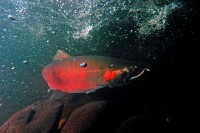
Waterkeepers Washington, a coalition of Columbia Riverkeeper, Puget Soundkeeper Alliance, North Sound Baykeeper, and Spokane Riverkeeper, put the U.S. Environmental Protection Agency (EPA) on notice it could be sued under the federal Clean Water Act for failing to protect Washingtonians from toxic pollution in locally caught fish and shellfish. Studies across Washington State show high levels of toxic pollution in many types of fish and shellfish. This undermines the public’s right to eat otherwise healthy locally caught food.
See King 5 video: Salmon: How Much We Eat Matters
The notice letter targets the so-called “fish consumption rate” issue. Earlier this year, this issue was at the heart of the near shutdown of state government when Boeing and other industries lobbied the state to add years of delay to new toxic pollution laws. According to the Waterkeeper groups, EPA is violating the law by allowing Washington State to grossly underestimate the state’s fish consumption rate, which is used to set water quality standards. Washington incorrectly estimates its citizens have one of the lowest fish consumption rates in the nation. Consequently, water pollution limits are too high and fail to protect people who eat locally caught fish.

"Why do states like New Jersey and Oregon have better protection against toxic pollution than Washington?" stated Brett VandenHeuvel, Executive Director of Columbia Riverkeeper. "We should be proud of our fishing heritage and stand for clean water, not bow to industry pressure."
Members of Waterkeepers Washington filed the notice letter after years of unsuccessful attempts to persuade EPA and Washington State to set a realistic fish consumption rate and better protect people's health from the risks of neurological damage, cancer and other diseases.
Download copies of the press release and Notice of Intent to Sue.


